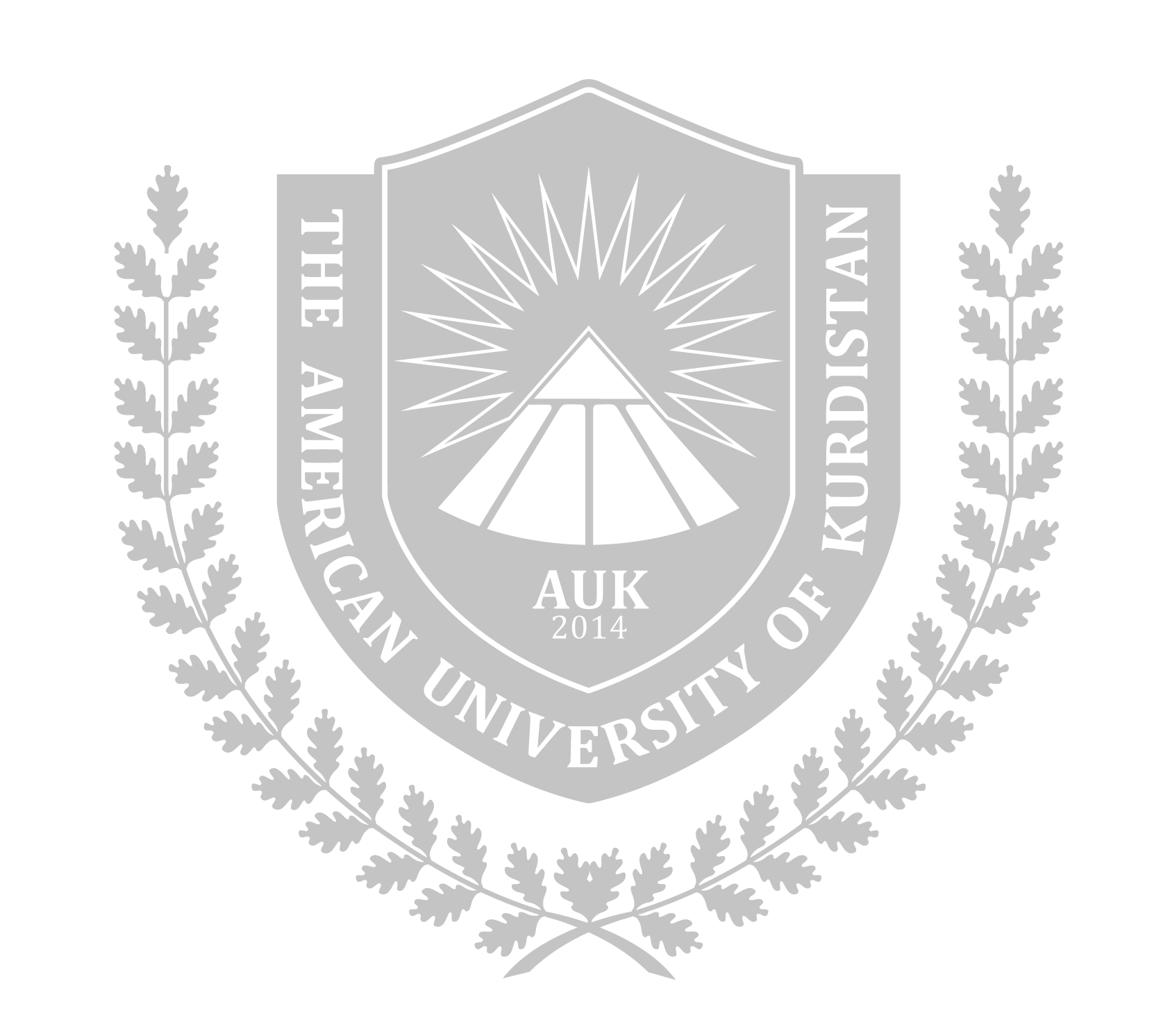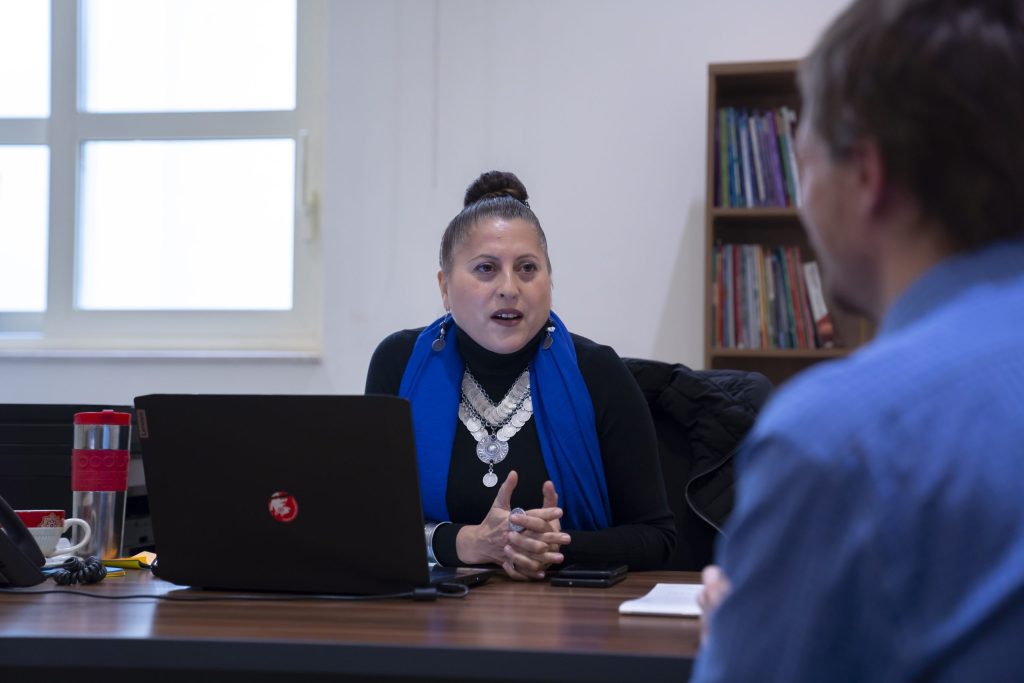Interview with CAPA Director Loucine Hayes
Loucine Hayes heads up the Center for Academic and Professional Advancement (CAPA) at the American University of Kurdistan (AUK). CAPA is involved in manifold forms of community outreach on behalf of AUK. To explain what CAPA does, it would be appropriate to cite their most recent annual report: “CAPA’s vision is to bridge the gap between AUK and the community, both the public and private sectors, in order to enable meaningful learning and facilitate the transfer of knowledge and skills in order to create a skillful, educated workforce and productively engaged citizens.” More succinctly, CAPA promotes continuous education and lifelong learning. Loucine Hayes is a model director for CAPA, in that she epitomizes “continuous education” and “lifelong learning”; she speaks multiple languages, and she has proven herself to be highly adaptable and capable in a number of roles across a number of countries. AUK Content Writer Michael Collins interviewed her to understand better the contributing factors to her ongoing success and to get a preview of what CAPA, under her direction, might be engaged in next.
I am personally interested in the history of the Soviet Union, and you should have some insights about it since you grew up in the Soviet Union yourself. What was it like growing up in the Soviet Union, and how do you think it helped shape you into the person you are today?
Loucine Hayes:
“I grew up in a wonderful small town called Talin, Armenia. It is a mountainous place; during my childhood, it was a very clean, green, and bustling place, where all the people from nearby villages would come to do their business, do shopping, see the latest movie or performance in the theater, or just hang out in the square and speak to fellow people. We had a very high-functioning cultural center that had rich programs of music, dance, art, and theater. And the library was my favorite. I was one of their best readers, and, without exaggeration, I read almost all the books in that library. Books were and are my best friends. Growing up in the Soviet Union was not such a bad experience. We had ample food, electricity, and housing, and I attended one of the best schools, which gave me excellent education and shaped, in a lot of ways, who I am today. I also attended music school and was exposed to art, culture, and traditions as part of everyday life. The Soviet education system was very effective, and the world should learn from it. I learned languages and literature, practiced my science skills in labs that were well-equipped to enable students to explore, test, practice, and learn. They taught us to love Mother Nature and take care of it, to recycle, and to learn all the plants that grew in our area by their functions. They put emphasis on sports; we practiced so many, from skiing to gymnastics to basketball to volleyball. We had almost everything, but we lacked what some would say was the most important thing: freedom. We knew that so much was possible, but only within the restrictions of the Soviet Union. The only escape was through our Literature teacher, who was very talented and open-minded. She taught us to dream, to think critically and creatively. She developed our skills at self-expression in public speaking and writing. I grew up in a very loving and big family; my grandparents, parents, uncles, and aunts shaped the person that I am today and gave me, most importantly, love. They reinforced for me the values that matter the most: love your friends and family, work hard, and be honest.
You are from Armenia, which has some Kurdish communities and, like Iraqi Kurdistan, is one of the few parts of the world with a sizable Yazidi minority (Armenia is actually home to the world’s largest Yazidi temple). How were your experiences with the Kurdish and Yazidi people in Armenia?
Loucine Hayes:
“I grew up in the region with the most Kurds in Armenia, and when I was young my best friend was a Yazidi, Zine Shababian. The very first Kurdish-language radio broadcasting in the world was in Armenia, and it was founded by Aram Tigran, who is a well-loved singer here in Kurdistan and beyond. My mother was a teacher of Armenian language and literature, and she traveled every day to remote villages to teach in Yazidi and Kurdish schools. Till this day, she remembers fondly her wonderful and loving students, and they show they remember her with visits and phone calls. My father was a policeman, with oversight of Kurdish and Yazidi villages, and over time we came to have good friends in those communities. We always respected one another and lived peacefully.”
You personify the “American dream,” since you immigrated to the United States at a later age, acquired US citizenship, and went on to considerable success. Many AUK students may aspire to live and work in the US and eventually acquire US citizenship. How was the process of getting US citizenship for you, and just how “American” do you feel today?
Loucine Hayes:
“I feel about as American as anyone else, and I’ll tell you why. I chose to become an American myself; I didn’t choose to do so because the passport looked good, as many others have. I chose to do so consciously because I saw and fell in love with the American creative mind, hard work, and the drive to do good. I was enamored of the possibility America offered, namely, that with hard work you can achieve your dreams. People in the Soviet Union had all their basic needs accounted for, but there was little reason or reward for ambition. I believe in the future of America, even though it is now going through turbulence. I married a Peace Corps Volunteer, and I later became a Peace Corps Country Director myself. The Peace Corps Volunteers epitomize the American spirit, going out to make a difference, and that was the attitude I had myself. I am proud to be an American, and I am especially proud to be a Tennessean, because they are some of the warmest and kindest people I have met. And maybe that is why the Kurdish community in the US is concentrated in Tennessee, Kurds being some of the kindest and warmest people themselves.”
You bring to AUK extremely rich experience working with NGOs, and I understand you worked for Habitat for Humanity in Eastern Europe and the Asia-Pacific region. What is one building project Habitat for Humanity was engaged in with your involvement that you are particularly proud of?
Loucine Hayes:
“After I arrived in Vanuatu in 2004, it was hit by Cyclone Ivy within a month. Moreover, right before I went there, it had been hit by an earthquake. Some of the homes were totally destroyed by the double disaster. I raised money with two prominent donors, I introduced two technologies, interlocking blocks and roof tiles, and I built 150 homes for a particular community, which was called Beverly Hills. Years later, Beverley Hills was hit by another devastating cyclone. They sent me a letter, addressing me as they had before as “Missus,” and expressed appreciation for the homes I had helped them build, as they were still standing after the latest cyclone.”
I also heard you were a Peace Corps Country Director, in the East African nation Uganda. I myself have looked at the application requirements for a Peace Corps Country Director, and I can confirm excellent credentials are needed even to be considered for any such role. How challenging was your service as a Peace Corps Country Director?
Loucine Hayes:
“At that time, I was one of only 67 Peace Corps Country Directors, so getting hired in the role was a competitive process. In the Peace Corps, they say it is the toughest job you will ever love. That is true. There were no breaks; it was 24/7. I was responsible for over 200 Americans in a challenging country – hit by Ebola, plagued by political instability, and sometimes experiencing terrorist attacks by Al-Shabaab. Under those trying circumstances, I had to make a difference, and I did. I helped restructure the primary education program working closely with the government, establishing a teacher training center and revising the curricula. I also implemented the first Medical Exchange program in Uganda, with Seed Global Health bringing doctors and nurses to Uganda to serve as adjunct faculty at university teaching hospitals. Through this program, we established the first degree-issuing nursing university in Lira, Uganda”.
You are now the head of CAPA at AUK, and you were in a similarly high-ranking position at a university in Armenia right before coming to AUK. What exactly did you do at the university in Armenia, and how did it prepare you for leadership of CAPA?
Loucine Hayes:
“At the American University of Armenia [AUA], I rebranded ‘AUA Extension’ to ‘AUA Open Education.’ With rebranding comes a whole new vision. That means you expand outreach and put more emphasis on regional development, including bringing meaningful education programs to villages in Armenia and Artsakh.
I established a rich program, expanded it to new regions, and introduced new testing services and educational programs. I brought all that experience and knowledge to AUK to establish CAPA. We built on the English Language Institute heritage to found CAPA and extend meaningful educational outreach to communities in Iraqi Kurdistan. Doing so, we put the emphasis on quality and accessibility. In our search for the best resources and approaches for the students in Kurdistan, we settled on National Geographic’s Pathways English language program. During the first year, we introduced a new curriculum for academic success and professional advancement, the Young Learners program, and established the Testing Center, where we do placements tests for our own programs as well as administer the TOEIC, TOEFL, and Pearson tests. Apart from the language program, we introduced the professional development courses and diploma programs.”
Please look ahead to the start of the 2023-24 academic year, in August 2023. What do you anticipate the #1 priority for CAPA at that time will be?
Loucine Hayes:
“CAPA is operational all year. CAPA has ambitious plans for 2023, to establish fully the model school at Semeel for teacher training, launch the Design Thinking Tech Boot Camp, participate in the Kto19 Teacher Training Conference, and see to fully operational educational programs in Zakho in partnership with Zakho University. We will also carry out market research to understand lifelong learning needs and provide the requisite continuous education programs, to build a quality workforce for Kurdistan and the region.”

